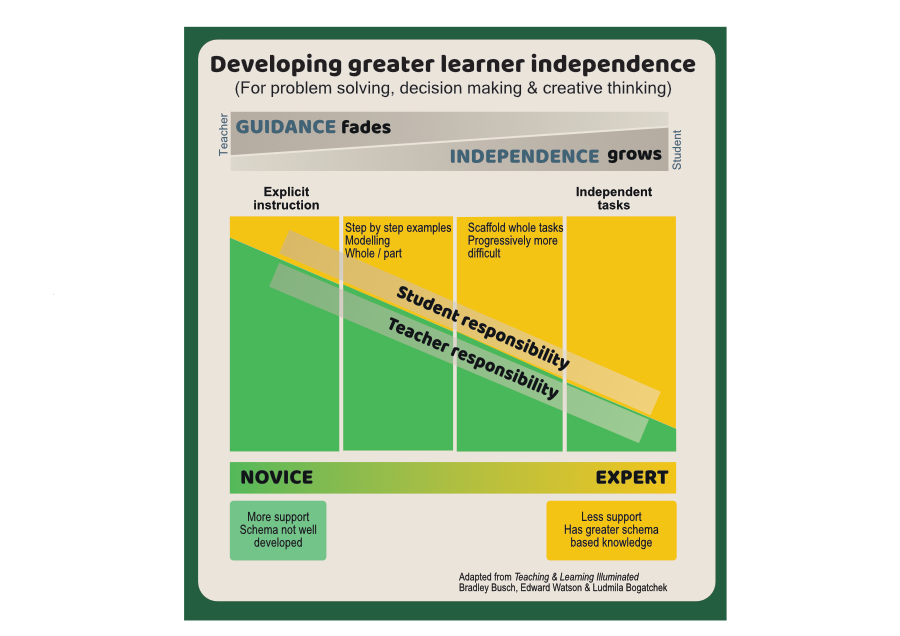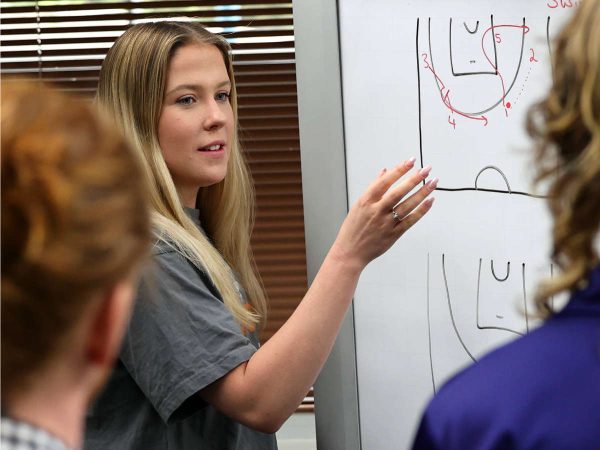Introduction
The way information is organised in the brains of novices and experts is different. Expert coaches read situations at a deeper level than do novice coaches. Experts see the underlying structures. Novices see the superficial detail.
This has important implications for the way coach developers support the development of coaches in their early stages of learning.
The coach developer’s dilemma
Don’t expect novice coaches to learn by doing what expert coaches do.
It is popular to say coaching is complex, non-linear, and unpredictable. This requires coaches to exercise professional judgement and decision-making skills. Coaching requires the management of a range of emotional and physical states, participant skill levels, participant anxiety and team dynamics that may be less than ideal. All without simple stock remedies.
For the coach developer working with novice and intermediate coaches, this snapshot of coaching presents significant challenges. A more experienced coach when asked will this or that work, may well say, “it depends”, highlighting the unpredictable nature of coaching. Implying that no single piece of advice can be universally applied.
This creates a dilemma for the CD. Throwing coaches into complex decision making too early in their development may be counterproductive. We have to take a short detour to see why.
Novices are not little experts
The cognitive (thinking) processes that experts use are different from those used by novices. In short, experts think differently from novices. This means that developing skills and knowledge early in a coach’s development is fundamentally different from learning at a later stage of the coach’s development.
“It’s not just that students know less than experts, it’s also that what they know is organised differently in their memory.” (1, p128)
This fundamental difference between novice and expert coaches means that as CDs we have to be aware of the curse of knowledge – the idea that experts forget how difficult learning may be in the early stages, and what is required to effectively learn.
According to the cognitive scientist Daniel Willingham there are important novice / expert differences (1). Some of his points are reproduced here:
• Experts show better transfer to similar domains than novices do.
• Even if novices have the same knowledge as experts, experts can access the right information with greater speed and accuracy.
• Experts are better able to single out important details, produce sensible solutions, and transfer their knowledge to similar domains.
• The extensive experience (and knowledge) of experts means that they will be able to transfer information more efficiently from working memory to long-term memory. This includes deriving benefits from practice more efficiently than novices.
• The information in the memory of experts is organised differently from the information in a novice’s long-term memory.
• Novices think in terms of surface features, whereas experts think in terms of functions, or deep structure.
Strategies for novice / intermediate coaches
Armed with these insights from cognitive science, we can plan for the learning experiences that are likely to be more successful for coaches at the beginning of their learning journey. We have touched on some of these strategies above.
Here is a summary of strategies for novice and intermediate coach learning consistent with the insights above (2):
• Be clear about where coaches are starting from (prior knowledge and skills). Build from there.
• Use learning experiences that are consistent with the working memory capacities of the coaches.
• Use graphics or other visual techniques to show coaches the big picture – where they are going and how things connect to each other.
• Use multi-sensory teaching strategies (visual, auditory, kinaesthetic, tactile).
• Provide modelling / demonstrations and worked examples.
• Build on surface knowledge by challenging coaches with thinking tasks (problem solving, application etc).
• Provide opportunities for collaboration.
• Provide feedback / feed forward, ask questions, collaborate on next steps.
• Provide ample opportunities for spaced practice (practice in small doses spread out over time).
Scaffold support & fade guidance
A learner-centred approach is one where coaches are provided opportunities to take responsibility for their own learning.
Helping learners take more responsibility for their own learning can be developed over time. This approach is summarised in the graphic below (3,4)

The model in a nutshell:
I DO > WE DO > YOU DO
A closer look at the model
• The purpose of the model is to help CDs choose learning experiences that consider where coaches are on the novice – expert spectrum.
• Novices have less knowledge, skills & experience, so more guidance is required.
• Guidance is reduced as coaches develop more expertise (called the guidance fading effect).
• Too much information too early will confuse coaches (working memory overload), just as too little guidance will have the same effect.
• The model is not a recipe for CDs or coaches. That is, be prepared to go back a step or two to progress at a later date. Sometimes another tack altogether will be needed.
• Even experts are ‘novices’ for some of the time (e.g., learning a new technology). The difference compared with novices is the greater experience & knowledge of experts, means it will be easier for them to relate to information in long-term memory & to see how new knowledge can be applied.
• A community coach in their context can be just as ‘expert’ as a performance coach. Just different types of expertise.
• The model assumes there is a favourable climate for learning and the learners are sufficiently interested, motivated & have the required prior knowledge.
Take outs
• Coaching is often described as complex, non-linear, and unpredictable.
• This calls for coaches to have the skills to make decisions and exercise judgement in the face of uncertainty. These are higher-order thinking skills.
• These higher order skills need to be taught in a coaching context and not in isolation.
• So called twenty first century skills such as problem solving, critical thinking, creativity and communication skills are domain specific. That is, to solve a problem in coaching, the coach needs to build up mental models (schemata) through actual coaching experience.
• Until coaches have enough relevant foundational knowledge and skills it would be counter-productive to throw a coach in their early stages of learning into situations where difficult decision making is required.
• Experts think differently from novices. Experts are better able to single out important details, produce sensible solutions, and transfer their knowledge to similar domains.
• Some higher-level coaching exposure beyond the current capabilities of a coach may have some motivational value for coaches even if actual learning is minimal.
• Understanding novice / expert differences, and how they relate to the choice of learning experiences and instructional strategies is important for CDs to know.
• Giving coaches too much independence from the start is not a good way to develop independent coaches!
Editors: Lawrie Woodman, Andrea Woodburn, Melanie Schembri-Waite



 By Gene Schembri
By Gene Schembri
 By Brett Reid
By Brett Reid